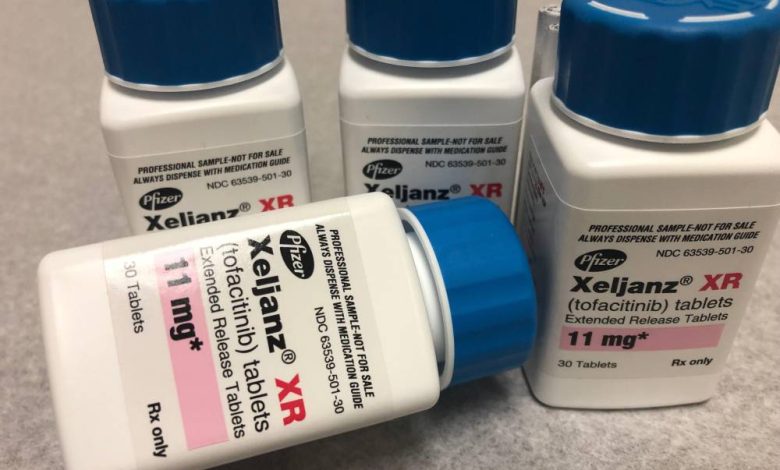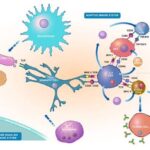JAK Inhibitor Drugs List

JAK inhibitors, also known as Janus kinase inhibitors, are a class of medications that target a group of enzymes called Janus kinases. These enzymes play a crucial role in the signaling pathways of various immune cells and are involved in the regulation of inflammatory and immune responses.
Janus kinases are part of the larger family of protein kinases, which are responsible for transmitting signals within cells. In the context of the immune system, Janus kinases are involved in the signaling of cytokines, which are small proteins that regulate immune responses, inflammation, and hematopoiesis (the formation of blood cells).
They are employed in the treatment of various autoimmune and inflammatory conditions to modulate immune responses and curb inflammation, offering relief to individuals with conditions such as rheumatoid arthritis, psoriatic arthritis, and ulcerative colitis. They are also being investigated for their hair growth potential. JAK inhibitors help manage symptoms, reduce joint damage, and improve overall quality of life by interfering with the aberrant immune responses that characterize these disorders.
How JAK inhibitors work
JAK inhibitors exert their therapeutic effects by specifically targeting and inhibiting the activity of Janus kinases (JAKs), a group of enzymes that play a crucial role in cell signaling, particularly within the immune system. Here is how JAK inhibitors work:
1. Cell Signaling and Janus Kinases (JAKs): Cells in the body communicate with each other through signaling pathways. These pathways involve the transmission of signals from the outside of the cell to the inside, triggering various cellular responses. Janus kinases are a family of enzymes that are integral to these signaling pathways. They are often activated in response to cytokines, which are small proteins that regulate immune responses, inflammation, and other critical processes.
2. JAK-STAT Pathway: One of the most well-known signaling pathways involving JAKs is the JAK-STAT pathway. This pathway is essential for transmitting signals from cytokines to the cell nucleus, where they regulate gene expression and, consequently, cellular responses. When a cytokine binds to its receptor on the cell surface, it triggers the activation of JAKs, which, in turn, phosphorylate (add phosphate groups to) STAT proteins. Phosphorylated STATs then form dimers (pairs) and move into the cell nucleus, where they modulate gene expression.
3. Modulation of Immune Responses and Inflammation: In conditions such as autoimmune diseases and inflammatory disorders, the immune system becomes dysregulated, leading to excessive inflammation and immune responses. JAK inhibitors intervene in this process by inhibiting the activity of JAK enzymes. By doing so, they disrupt the phosphorylation of STAT proteins and the subsequent transmission of signals that contribute to immune cell activation, inflammation, and tissue damage.
By targeting JAKs and the downstream JAK-STAT pathway, JAK inhibitors effectively dampen immune responses and inflammation. This is particularly beneficial in autoimmune diseases where the immune system attacks healthy tissues and causes inflammation, such as rheumatoid arthritis and psoriasis. JAK inhibitors help manage symptoms, reduce joint damage, and improve the overall quality of life for individuals with these conditions.
JAK Inhibitor Drugs List
Examples of approved JAK Inhibitor drugs include:
1. Tofacitinib (Xeljanz): Tofacitinib, marketed under the brand name Xeljanz, is a JAK inhibitor approved for several conditions. It’s indicated for the treatment of:
• Rheumatoid Arthritis: Tofacitinib is used in adults with moderate to severe rheumatoid arthritis who have not responded well to other disease-modifying antirheumatic drugs (DMARDs).
• Psoriatic Arthritis: It’s approved for the treatment of active psoriatic arthritis in patients who have not adequately responded to other therapies.
• Ulcerative Colitis: Tofacitinib is also indicated for adults with moderate to severe active ulcerative colitis who have not responded well to conventional therapy.
2. Baricitinib (Olumiant): Baricitinib, sold as Olumiant, is another JAK inhibitor with specific approved uses:
• Rheumatoid Arthritis: Baricitinib is approved for the treatment of moderate to severe rheumatoid arthritis as a monotherapy or in combination with other DMARDs.
• Atopic Dermatitis: It’s also indicated for moderate to severe atopic dermatitis in adult patients who have not adequately responded to other systemic therapies.
3. Upadacitinib (Rinvoq): Upadacitinib, available as Rinvoq, is indicated for the treatment of:
• Rheumatoid Arthritis: It’s approved for the management of moderate to severe rheumatoid arthritis in adults who have had an inadequate response or intolerance to methotrexate.
4. Ruxolitinib (Jakafi): Ruxolitinib is a unique JAK inhibitor with different primary uses:
• Myelofibrosis: Ruxolitinib, marketed as Jakafi, is approved for the treatment of intermediate or high-risk myelofibrosis, a rare bone marrow disorder.
• Polycythemia Vera: It’s also indicated for polycythemia vera in patients who have not responded well to or are intolerant of hydroxyurea.
5. Filgotinib: Filgotinib is an emerging JAK inhibitor used for autoimmune conditions:
• Rheumatoid Arthritis: It’s approved for the treatment of moderate to severe rheumatoid arthritis as a monotherapy or in combination with methotrexate.
• Inflammatory Bowel Diseases: Filgotinib is indicated for certain inflammatory bowel diseases, such as Crohn’s disease and ulcerative colitis, in patients who have not adequately responded to other treatments.
6. Peficitinib: Peficitinib is another JAK inhibitor with specific uses:
• Rheumatoid Arthritis: Peficitinib is approved for the treatment of rheumatoid arthritis in some countries.
Is there a list of natural JAK Inhibitors?
No, there are no natural compounds that are directly equivalent to pharmaceutical JAK inhibitors. However, there are some natural substances have been studied for their potential to modulate Janus kinase activity or affect related pathways involved in immune responses and inflammation. Note that the efficacy and safety of these natural substances are not well-established, and their use should be approached with caution and under the guidance of a healthcare professional. Here are a few natural compounds that have been investigated for their potential JAK inhibitory effects:
1. Curcumin: Curcumin is a polyphenolic compound found in turmeric. It has been studied for its anti-inflammatory properties and its potential to inhibit JAK-STAT signaling pathways. While research is ongoing, curcumin’s mechanisms of action are complex and may involve various pathways.
2. Green Tea Extract: Green tea contains compounds such as epigallocatechin gallate (EGCG) that have anti-inflammatory properties. Some studies suggest that EGCG may modulate JAK-STAT pathways, but more research is needed to understand its exact effects.
3. Resveratrol: Resveratrol is a polyphenol found in grapes, red wine, and certain plants. It has been investigated for its potential to inhibit inflammatory pathways, including those involving JAK-STAT signaling.
4. Quercetin: Quercetin is a flavonoid found in various fruits, vegetables, and herbs. It has been studied for its anti-inflammatory effects and its potential to influence JAK-STAT signaling.
5. Boswellia Serrata: Also known as Indian frankincense, boswellia serrata extract has been studied for its anti-inflammatory properties. It may impact pathways related to inflammation and immune responses, but its direct effects on JAK-STAT pathways are not fully understood.
6. Ginger: Ginger contains bioactive compounds with anti-inflammatory effects. Some studies suggest that ginger may influence pathways associated with inflammation and immune responses, but its specific interactions with JAK-STAT pathways are not well-established.
7. Omega-3 Fatty Acids: Found in fatty fish and certain plant sources, omega-3 fatty acids have anti-inflammatory properties. They may affect various pathways involved in inflammation and immune regulation.
It’s important to emphasize that the effects of these natural compounds on JAK-STAT pathways and immune responses are still being studied, and the available evidence is often preliminary or inconclusive. If you’re considering using natural compounds for their potential JAK inhibitory effects, consult with a healthcare professional to ensure that they are safe and appropriate for your specific health condition. Additionally, remember that these substances should not be used as a replacement for prescribed medications without proper medical guidance.





